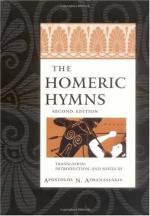“Wherefore, thou cunning one, and whence comest thou in the night, thou clad in shamelessness? Anon, methinks, thou wilt go forth at Apollo’s hands with bonds about thy sides that may not be broken, sooner than be a robber in the glens. Go to, wretch, thy Father begat thee for a trouble to deathless Gods and mortal men.”
But Hermes answered her with words of guile: “Mother mine, why wouldst thou scare me so, as though I were a redeless child, with little craft in his heart, a trembling babe that dreads his mother’s chidings? Nay, but I will essay the wiliest craft to feed thee and me for ever. We twain are not to endure to abide here, of all the deathless Gods alone unapproached with sacrifice and prayer, as thou commandest. Better it is eternally to be conversant with Immortals, richly, nobly, well seen in wealth of grain, than to be homekeepers in a darkling cave. And for honour, I too will have my dues of sacrifice, even as Apollo. Even if my Father give it me not I will endeavour, for I am of avail, to be a captain of reivers. And if the son of renowned Leto make inquest for me, methinks some worse thing will befall him. For to Pytho I will go, to break into his great house, whence I shall sack goodly tripods and cauldrons enough, and gold, and gleaming iron, and much raiment. Thyself, if thou hast a mind, shalt see it.”
So held they converse one with another, the son of Zeus of the AEgis, and Lady Maia. Then Morning the Daughter of Dawn was arising from the deep stream of Oceanus, bearing light to mortals, what time Apollo came to Onchestus in his journeying, the gracious grove, a holy place of the loud Girdler of the Earth: there he found an old man grazing his ox, the stay of his vineyard, on the roadside. {144} Him first bespoke the son of renowned Leto.
“Old man, hedger of grassy Onchestus; hither am I come seeking cattle from Pieria, all the crook-horned kine out of my herd: my black bull was wont to graze apart from the rest, and my four bright-eyed hounds followed, four of them, wise as men and all of one mind. These were left, the hounds and the bull, a marvel; but the kine wandered away from their soft meadow and sweet pasture, at the going down of the sun. Tell me, thou old man of ancient days, if thou hast seen any man faring after these cattle?”
Then to him the old man spake and answered:
“My friend, hard it were to tell all that a man may see: for many wayfarers go by, some full of ill intent, and some of good: and it is difficult to be certain regarding each. Nevertheless, the whole day long till sunset I was digging about my vineyard plot, and methought I marked—but I know not surely—a child that went after the horned kine; right young he was, and held a staff, and kept going from side to side, and backwards he drove the kine, their faces fronting him.”
So spake the old man, but Apollo heard, and went fleeter on his path. Then marked he a bird long of wing, and anon he knew that the thief had been the son of Zeus Cronion. Swiftly sped the Prince, Apollo, son of Zeus, to goodly Pylos, seeking the shambling kine, while his broad shoulders were swathed in purple cloud. Then the Far-darter marked the tracks, and spake:




